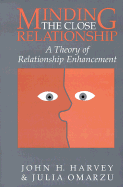Book contents
- Frontmatter
- Contents
- Preface and Acknowledgments
- 1 Introduction to the Minding Concept
- 2 Minding: Definition and Components
- 3 Knowing and Being Known by One's Partner
- 4 Attributions in Close Relationships
- 5 Acceptance, Respect, Reciprocity, and Continuity
- 6 Beginnings and Endings
- 7 Minding in the Close Relationship Literature
- 8 Minding and Other Major Concepts of Closeness
- 9 Evidence about Minding in Close Relationships
- 10 An International Perspective on Minding
- 11 Minding in Couples Therapy and Counseling
- 12 Limitations and Future Directions
- References
- Index
4 - Attributions in Close Relationships
Published online by Cambridge University Press: 14 September 2009
- Frontmatter
- Contents
- Preface and Acknowledgments
- 1 Introduction to the Minding Concept
- 2 Minding: Definition and Components
- 3 Knowing and Being Known by One's Partner
- 4 Attributions in Close Relationships
- 5 Acceptance, Respect, Reciprocity, and Continuity
- 6 Beginnings and Endings
- 7 Minding in the Close Relationship Literature
- 8 Minding and Other Major Concepts of Closeness
- 9 Evidence about Minding in Close Relationships
- 10 An International Perspective on Minding
- 11 Minding in Couples Therapy and Counseling
- 12 Limitations and Future Directions
- References
- Index
Summary
The mind is not a vessel to be filled, but a fire to be lighted.
PlutarchKnowledge about one's partner is a necessity to the minding process, but it is not enough to guarantee a relationship's success. What is done with knowledge once it is gained? How do successful relationship partners process and account for conflicting or negative information that may be learned? How does the way in which we think about our partner's behavior affect the way we feel about our partner?
This chapter continues our discussion in Chapter 3 of the quest to know the other, but it emphasizes the conclusions we develop during this quest. These conclusions we come to about our partners, after listening and observing, take the form of attributions and other kinds of inferences.
Attributions are the mental explanations we create in order to understand events or behavior. Why are these attributions of vital significance to minding? Why does it matter to the long-term success of our close relationships what we think caused particular relationship events to occur? Why does it matter what particular traits we attribute to our partner? Why does it matter what evidence we use in inferring causality for relationship events and attributing particular traits to our partner?
These questions are at the heart of the inspiration for the minding theory. They directly address the importance of the use of the mind in relating. The attributional component of minding theory addresses how we cognitively utilize the knowledge structures we have about our partners and about relationships in general.
- Type
- Chapter
- Information
- Minding the Close RelationshipA Theory of Relationship Enhancement, pp. 61 - 83Publisher: Cambridge University PressPrint publication year: 1999



